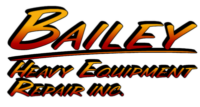When Do You Need to Have Your Heavy Equipment Repaired?
No matter how well-maintained your heavy equipment fleet may be, there’s always a chance of something breaking down. How do you know whether it’s a problem that requires heavy equipment repair, or if you can get away with simple maintenance in Lexington, OR? Here’s a quick guide to when you need to take your heavy equipment in for repair.
Forestry equipment
Forestry equipment, like forestry dozers and road builders, tend to be complex pieces of equipment. If you’re not familiar with their intricate mechanical components, it can be hard to tell when it’s time to take it in versus when you can get away with maintenance. Luckily, you can treat this kind of equipment like you would a regular vehicle. First, check all the fluids to ensure that they’re clean and at their appropriate levels—flush or top them off if you find issues with the fluids. Look over the wires and valves to ensure they’re functioning appropriately, too.
Next, look for rust and corrosion on the exterior and internal components. Rust can form quickly, especially in rainy places like Oregon. The faster you discover the rust, the more likely you’ll be able to continue using the vehicle. However, if the rust is widespread or damaging the structural integrity, you’ll probably want to take it in to replace the parts.
If you can’t find the source of the problem, take your vehicle in right away. There’s no shame in letting the experts handle it.
Aerial lifts
Pay special attention to your aerial lifts—any time you have employees working at great heights, you must ensure their safety. Like any equipment, aerial lifts will deteriorate with age. It probably doesn’t need to be replaced, however, unless your heavy equipment mechanic deems it DOA.
OSHA recommends that owners do periodic inspections. First, check the fluids and make sure they’re clean, topped off and not leaking. Move on to the electrical components and any valves: are they functioning properly, too? Is anything loose, unharnessed or missing?
Finally, you should go through the lift and test every function you use on a daily basis: press every button and test every alarm until you’re satisfied it’s operating properly. If there are any issues, take it in for repairs. It’s better to be safe than sorry.
Hydraulic valves
Finally, hydraulic valves can fail over time. If yours is performing less reliably than normal, be aware that they sometimes seem less productive after extended use. To that end, check the fluids and filters to ensure there are no issues there.
Because hydraulics are complicated pieces of machinery, you may not be able to identify the root of the problem. If that seems to be the case, bring your machinery to Bailey Heavy Equipment Repair, Inc. for an inspection.
If you’re not sure whether your heavy equipment needs maintenance or repair in Lexington, OR, the experts at Bailey Heavy Equipment Repair, Inc. are here to help. Get in touch with us today to learn more and set up an appointment.
